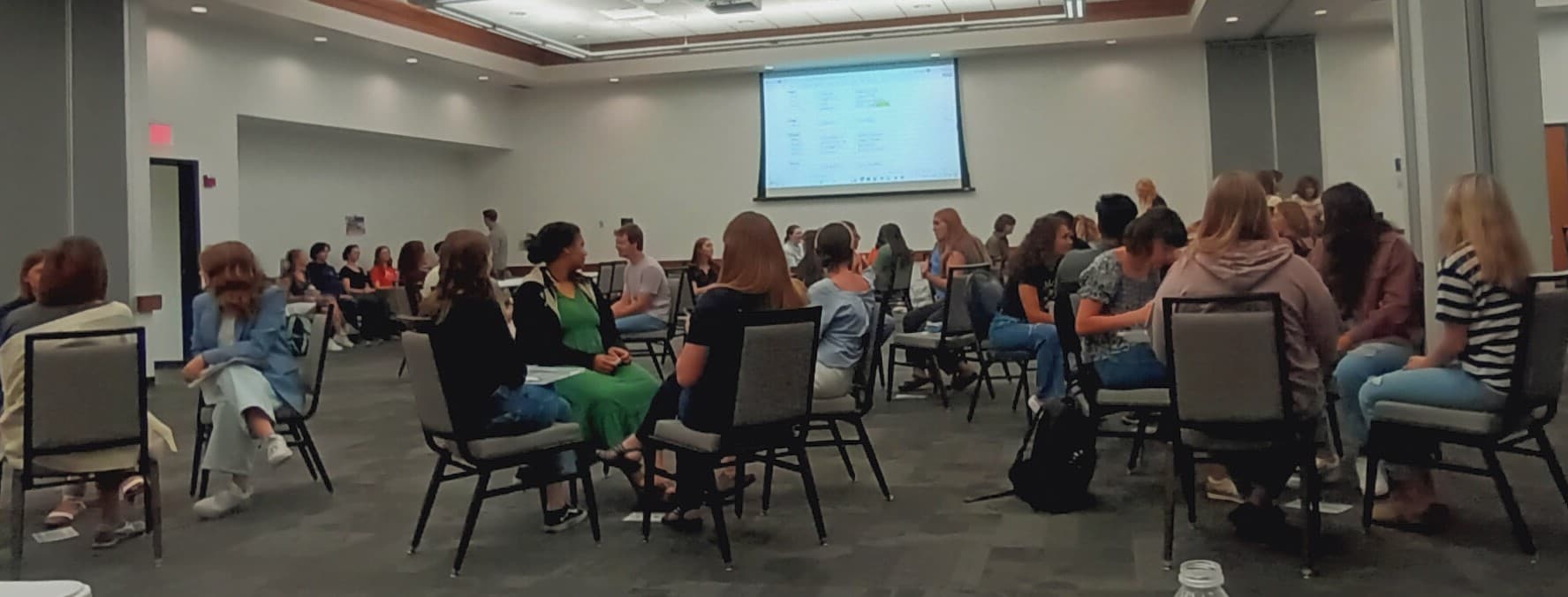Led by a professor who has seen poverty firsthand, the seniors in the Cedarville University School of Nursing experienced a poverty simulation that opened their eyes to hard realities and instilled greater compassion for the poor in their communities.
The simulation, held every August for the Care of Populations course, consisted of groups of tables to replicate homes, businesses and a homeless shelter. Students were grouped into families, playing the roles of the homeless, parents, grandparents, children, single mothers, elderly widows, and immigrants who struggled to speak English.
The students quickly realized that language, mobility and illness caused barriers to working, caring for families, managing finances and getting help when needed.
“Poverty affects everything,” said Dr. Carolyn Barnett, associate professor of nursing and coordinator of the simulation. “When you haven’t experienced something, you just go by what you hear, not by what you truly understand. This simulation served to challenge misconceptions and stereotypes about the poor.”
The hourlong simulation represented one month, with each 15-minute interval representing a week. Things like work, buying groceries, paying bills and caring for children needed to be done each week. But when children got sick and parents missed work, people began losing their jobs. When rent was increased, there was no longer money for groceries. And among some people who were desperate, illegal activities began to arise.
“People think that making bad choices makes you poor, but sometimes it’s the other way around,” Barnett said. “Many people already in poverty are backed against a wall with difficult choices, and they try their hardest to make better choices, but sometimes none of the options are good.”
At the end of the simulation, students broke into groups to debrief their experiences.
Rebekah Nielsen, a senior nursing major from Appleton, Wisconsin, played the role of an 84-year-old woman, Sally. Though she lost her home through financial hardship, she was able to start renting and made it through the simulation relatively well. However, her age prevented her from going out into the community, leading to emotional isolation.
“Sally’s physical needs were met, but her emotional needs were not,” Nielsen said. “I just got lost in the busyness. It was lonely. That’s not a perspective I really had before.”
As the students talked about how they felt during the simulation and the difficulties they faced, it changed their thinking. They got a very small taste of the mental and physical toll poverty can present, but they could clearly see how difficult it is for people to thrive in these situations.
“I want people, especially believers, to know how to be more sensitive to those who are near or in poverty,” Barnett said. “It’s not a political issue, it’s a human issue.”
Being equipped with this new understanding and compassion for the poor, Cedarville’s nursing students are better able to serve their communities and be sensitive to their patients.
Cedarville University, a Baptist institution in southwest Ohio, offers undergraduate and graduate residential and online programs across arts, sciences, and professional fields. With 6,384 students, it ranks among Ohio's largest private universities and is recognized by the Wall Street Journal as being among the nation’s top three evangelical universities. Cedarville is also known for its vibrant Christian community, challenging academics, and high graduation and retention rates. Learn more at cedarville.edu.
